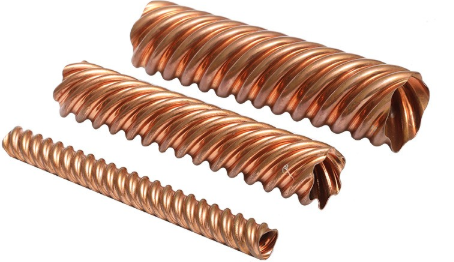As Copper Tubes Factory, We insist on scientific development and take the road of harmonious development of environmental protection economy and new industrialization.
The difference between copper tube and brass tube-copper tube and its advantages

The copper tube has high strength at low temperature. Generally used to make heat exchange equipment (such as condensers, etc.). It is also used to assemble cryogenic pipelines in oxygen equipment. Brass pipes with small diameters are often used to transmit pressured liquids (such as lubrication systems, hydraulic systems, etc.) and pressure pipes for external surfaces. Copper pipes are strong and anti-corrosive. Modern contractors prefer to install water pipes, heating, and air conditioners for all residences.
Strengths: Comparing copper pipes with ordinary plastic pipes, it can be found that the primary material of plastic pipes contains chemically increasing components such as plasticizers, which can easily escape or cause plastic hardening and embrittlement according to changes in time and temperature.
The copper pipe does not have various chemical components such as modifiers, additives, and enhancers of plastic pipes, and its properties are very stable. In addition, the coliform bacteria that are being supplied cannot continue to multiply in the copper pipes, and more than 99% of the bacteria in the water will be completely killed after entering it within 5 hours. In addition, the arrangement of copper pipes is very tight and has no permeability.
Oil, bacteria, viruses, oxygen, ultraviolet rays and other harmful substances cannot pass through and cannot pollute water quality. In addition, the copper tube does not contain chemical additives, does not burn toxic gases, and can be released and suffocated. In addition, the recycling of copper contributes to environmental protection and is a sustainable green building material.
The difference between copper tube and brass tube-brass tube and its advantages
Brass tube A type of non-ferrous metal tube, a lubrication pipeline that is compressed and pulled. Brass has strong and anti-corrosion characteristics. Modern contractors prefer to install water pipes, heating and air conditioners for all residences. Brass has strong and anti-corrosion characteristics. Modern contractors prefer to install water pipes and heating for all residences. , Air conditioner is the best water supply pipe.
Advantages: The brass tube is light in weight, good in thermal conductivity, and high in strength at low temperatures. Generally used to make heat exchange equipment (such as condensers, etc.). It is also used to assemble cryogenic pipelines in oxygen equipment. Brass pipes with small diameters are often used to transmit pressured liquids (such as lubrication systems, hydraulic systems, etc.) and pressure pipes for external surfaces. The brass tube is strong and corrosion-resistant.

 English
English 简体中文
简体中文






 WhatsApp:+86 13705857627
WhatsApp:+86 13705857627